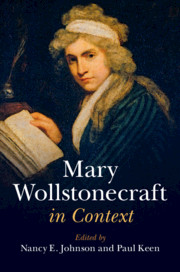Book contents
- Mary Wollstonecraft in Context
- Mary Wollstonecraft in Context
- Copyright page
- Contents
- Illustrations
- Notes on Contributors
- Preface
- Frontispiece
- Chronology
- Part I Life and Works
- Part II Critical Fortunes
- Part III Historical and Cultural Contexts
- The French Revolution Debate
- The Rights of Woman Debate
- Philosophical Frameworks
- Chapter 16 French Philosophes
- Chapter 17 Dissenters
- Chapter 18 Jean-Jacques Rousseau
- Chapter 19 Edmund Burke
- Chapter 20 William Godwin
- Chapter 21 Political Theory
- Chapter 22 Feminist Theory
- Legal and Social Culture
- Literature
- Suggested Further Reading
- Index
Chapter 16 - French Philosophes
from Philosophical Frameworks
Published online by Cambridge University Press: 16 January 2020
- Mary Wollstonecraft in Context
- Mary Wollstonecraft in Context
- Copyright page
- Contents
- Illustrations
- Notes on Contributors
- Preface
- Frontispiece
- Chronology
- Part I Life and Works
- Part II Critical Fortunes
- Part III Historical and Cultural Contexts
- The French Revolution Debate
- The Rights of Woman Debate
- Philosophical Frameworks
- Chapter 16 French Philosophes
- Chapter 17 Dissenters
- Chapter 18 Jean-Jacques Rousseau
- Chapter 19 Edmund Burke
- Chapter 20 William Godwin
- Chapter 21 Political Theory
- Chapter 22 Feminist Theory
- Legal and Social Culture
- Literature
- Suggested Further Reading
- Index
Summary
Though a reader, reviewer, and translator of contemporary French works, Mary Wollstonecraft was primarily engaged with the writings of British authors. The most notable exception to this is, of course, Jean-Jacques Rousseau, the Genevan, with whose thought she had a complex relationship, as is discussed in Chapter 18 of this volume by Laura Kirkley. Rousseau wrote on subjects that concerned Wollstonecraft most particularly: education, morality, political economy, and the progress of civilization. He was obviously not unique in so doing among writers in French or within the philosophes’ circles. What marked him out, apart from his phenomenal success in Britain, especially as the author of Emile, was his stance on religion, to which he appeared to be open or at least not as staunchly critical as authors such as Voltaire (1694–1778) and Diderot (1713–84) were taken to be. This is not to say that the ideas debated in Parisian salons and the philosophes’ literary output were irrelevant to her. She engaged with some of these through the work of British authors, such as Edmund Burke (1729–97), David Hume (1711–76), and Adam Smith (1723–90). Moreover, if we cast our net a little more widely, it becomes clear that she took an interest in the work of the physiocrates and constitutional writers of the period, notably, the Abbé Emmanuel Joseph Sieyès (1748–1836). Moreover, Wollstonecraft read Montaigne (1533–92), François Fénelon (1651–1715), and other canonical French authors, who shaped mid-century and subsequent generations of thinkers. Thus it would be wrong to say that Wollstonecraft was not affected by at least some of the philosophes’ deliberations and even more so that she was ignorant of them. Her awareness of intellectual life in eighteenth-century France was evident from her earliest publications, but especially so following her stay in the years of its Revolution. However, as the philosophes were a very diverse group of thinkers and the Enlightenment is now recognized to have been not only a cosmopolitan enterprise but so multi-faceted as to be a questionable historical category, it would be misleading to seek to produce a single homogenous French philosophical context to Wollstonecraft’s own thoughts. Instead what follows will give a glimpse of some of the points of intersection between the two, more particularly, those with Montesquieu, Voltaire, Necker, and the économistes.
- Type
- Chapter
- Information
- Mary Wollstonecraft in Context , pp. 139 - 145Publisher: Cambridge University PressPrint publication year: 2020
- 1
- Cited by



